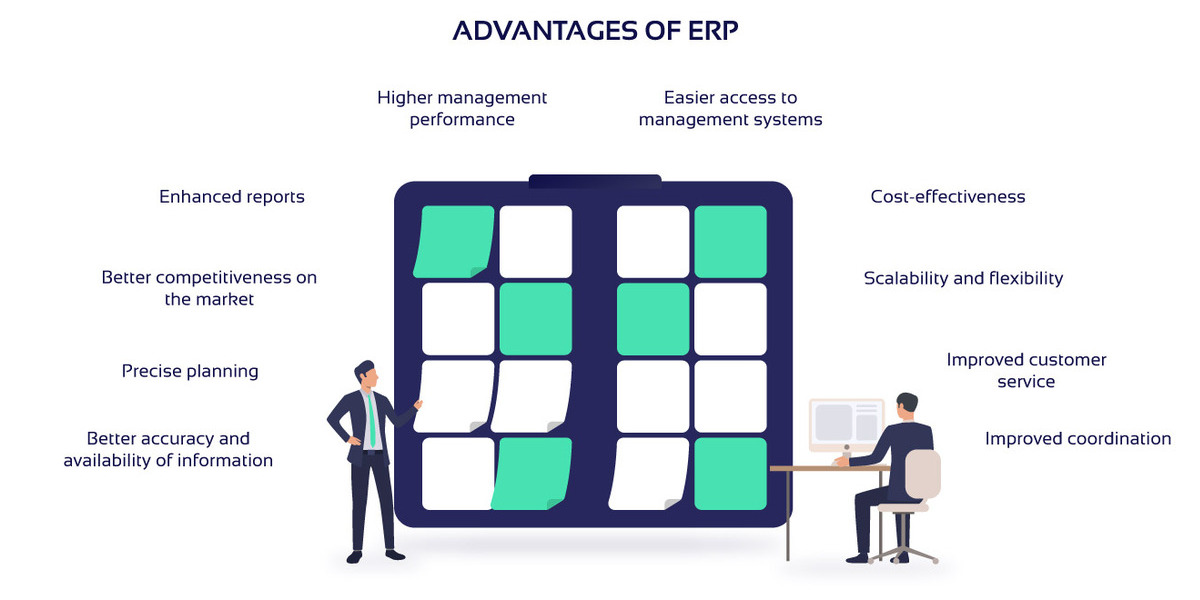If you have an ERP system or are thinking of adopting one, it’s important to know exactly what ERP modules you need for your business. ERP modules focus on a variety of crucial business processes. Each module focuses on its own unique process, so businesses that don’t need help in one area aren’t forced to add on a module with redundant functionality. Modules are those individual parts of a whole ERP system that any business can integrate as per need.
Small and medium business owners need the track of various resources such as sales leads, HR activities, inventories, cash flow, production capacity, as well as the status of the business orders, and payroll to ensure that the business is running efficiently. It’s often crucial for SME enterprises to make accurate and realistic projections and forecasts to deliver practical results and outcomes in their operations. They are in constant pursuit of efficiency and streamlined operations in the running of their business.
They must ensure that their business process and applications integrate and run seamlessly together. Business owners find all these tasks overwhelming and so there is a need for an ERP program to help to automate all their business operations. Selection of relevant ERP modules can give them a competitive edge over the competitors and also cut business costs, save time and increase the profitability of their business.
ERP system track business reserves such as cash, raw materials, products capacity and the status of business commitments, orders, purchase orders, and payrolls. The applications that make up the system share data across various departments such as sales, accounting, HR, manufacturing units, purchasing, etc. that provide the data. ERP system thus can help the SME businesses by
- Operating costs reduction
- Business insights Delivery
- Decision-making Improvement
- Minimizing the risk for data loss
- Integrated Operations within company
Top 7 ERP Modules Used By Small-Medium Businesses:
Let’s find out which are the top seven ERP modules used by small-medium businesses worldwide:
CRM: Customers are the most important stakeholders in any business. It’s always important to maintain customer relationship in order to retain customers and make the best out of those business relationships. CRM element to help SMEs boost customer service, manage leads, opportunities and customer issues. The ERP system offers overall profiling of the business customers through data consideration including data from their social media activities, historical and past purchases, interactions with support representatives among others and other relevant data.
The heart of a CRM is your list of customers, leads and prospects. This is some of your most valuable information for marketing and sales, but not necessarily the most valuable information. More robust CRM modules come with a contact manager that collects more than just names and email addresses. These contact managers feature the ability to record and track the interaction histories of your customers, leads, and prospects.
This helps your sales and marketing departments do their jobs, as they have a context for what you’ve already discussed and/or sent to each person. In today’s cut-throat business competition customer is the keys who allows you to earn revenue and providing proper service to them is again an important task of any organization. CRM module helps the business to improve customer relations, increase business revenues and maximize up-selling and cross-selling.
Inventory Management: Inventory management is the main challenge for most of the SMEs. There could be scenarios like the sales estimation is based mostly on guesswork; the company is struggling to keep up with an upsurge of orders or relies heavily on Excel spreadsheets; getting solid facts becomes problematic. To keep track of your goods, inventory module comes up with an easy to handle and auto-synced information tracking system.
Inventory management module has helped your business with features like synced with sales module, multiple Inventory and location management, Item Images, Units of measurement, keep track of stock movements, provide products whole history with reference, provide products stock value with a product, quantity, etc. Inventory management makes it easy for the business to increase inventory transparency, increase inventory efficiency, increase sales and purchase and improve delivery performance.
Accounting Module: Accounting module gives SME business owners fast, customizable access to the financial information and reporting tools they need to make critical business decisions and gives comprehensive access to accountants, bookkeepers, and CPAs to analyze, adjust and close on time and many more.
Accounting module has features like generating and validating customer invoice, registering payment, Integrating different payment methods, Generating vendor bills, creating an overdue receivable list, automatically giving Journal entries and Generic Accounting and Customized Reporting, etc. Accounting module is one of the most important modules since it works with the financials of the business. Accounting module can help the business with Increased Productivity, Reduced Monthly Expenses, Comply with rules and regulations, Real-time reporting and Increased profitability.
Purchase Module: Purchase is one of the major parts of any Industry. Purchase deals with all the items or products required which is not available in the stores department, It collects list of items which are required by the Industry, provides all departments with their necessary item requirements, keeps a ready count of the number of different items and deals with the suppliers in an endeavor to procure new stock. Purchasing Module makes purchasing, vendor management and receiving inventory fast and easy.
New vendor invoices can be created quickly by copying an existing invoice or creating a new invoice from a purchase order. Purchase returns are built into the software and allow for credit memos/refunds that can be received in cash receipts. It has features like Monitor RFQ(request for quotes) and orders, Manage incoming products, automate ordering, control future orders, handle internal moves, check stock and availability, Add product variants, etc. These features help the to Improve project profitability, Approve cost before incurred, Order Automation and many other purchase-related works.
Sales Module: Sales is the most important thing for a business to keep the business running properly. It’s needless to say that’s why the sales module is one of the key modules of the ERP system for any SME enterprise. Sales module provides in-depth insight into the main business processes of sales and distribution, such as inquiry, quotation, pricing and taxation, sales order processing, customer credit, backlog management, returns handling, and delivery, etc.
Sales module gives the businesses advantage by taking control of the quote and order-to-cash process with integrated approvals, discounting policies, pricing and more, accelerating the order management process with online approval and workflow management and reducing paperwork and errors.
Manufacturing Module: Manufacturing module is one of the widely used modules by small and medium enterprises. Manufacturing is the process by which raw materials are transformed into finished products. This huge and lengthy process is a combination of so many isolated tasks which is tough to put together and framed in one single picture. Mismanagement could easily happen in any sector of this process. The role of the ERP system’s manufacturing module is to complete the inventory management by implementing one centralized manufacturing module which will execute the operations specific to a streamlined manufacturing process.
Manufacturing module has features like Manufacturing orders, Work orders, Manage Bill of Materials, Organize work orders, Work-center Capacity, Optional routing, Worksheets. Manufacturing module of the ERP system helps your business to do proper manufacturing planning, deliver the product as per promised delivery dates, effectively use work centers and machines and minimize capital requirements for production.
HRMS: No ERP implementation is complete without the inclusion of a good human resources module. HRMS is a module that deals with every department, for the simple reason that it deals with all of your employees. With such valuable information and processes involved, it should be integrated with your ERP system for peak efficiency and accuracy. The HRMS tools such as the time tracker, time-sheet, employee records database, job profiles, and skills matrix. It may also include a payroll system and performance reviews. The payroll suite is integrated with the financial management tool to help manage wages, reimbursements, travel expenses.
One of the biggest advantages of ERP modules is the easy collaboration it creates. When systems are kept separate, data has to be shared manually. So if you need to share data from an HR system, you need to save it yourself in a format that can be used by the other system.
For example, if your sales representatives get bonuses based on the number of leads they convert, your HR system would need CRM data to know whether or not to administer those bonuses. Instead of counting them manually you can add an HR module to your ERP, your CRM data automatically gets shared with the HR module, automatically administering those bonuses when/if they’re earned. There could be other different types of integration as well to automate different processes. HRMS module of the ERP system helps the business to do better resource planning and allocation enhances sharing of information and collaboration, keeps data is up-to-date, supports role-based access control.
Although these are seven of the most commonly used Basic ERP modules by small and medium enterprises, these are by no means the extent of them. There are plenty of other modules that you can add to an ERP system. These are some of the most popular ERP system examples that small to mid-level companies are using, but there are many others on the market that may better suit the individual requirements of your business.
If you’ve overlooked the important in the past, remember this, 80% of the big and medium businesses in the world run with Enterprise Resource Planning solutions. Since every business is different. The best way to determine which ERP modules are a must-have for you is to sit down and go through every department of your business. Talk with the staff in each department and find out which manual tasks they are doing every day that could be automated with ERP. Once you have a map of your business and what you absolutely need, it is helpful to sit down with a consultant. They will be aware of which systems contain the ERP modules you need to be successful and help you through the implementation process.

